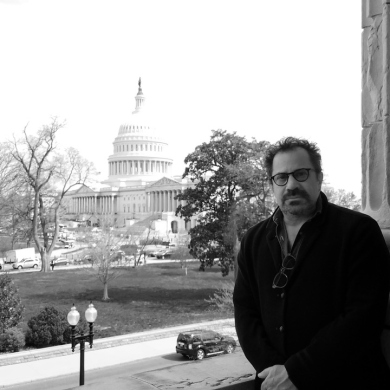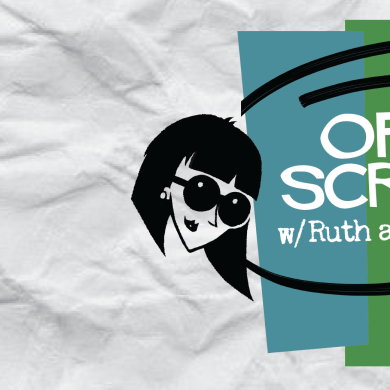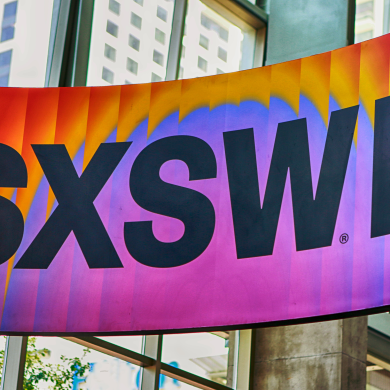By Ruth Vitale
The election is over, but political division is here to stay. Unfortunately. For now, we remain a deeply polarized nation.
It is a sad truth that many Americans are so passionate about their political beliefs that they cannot imagine discussing politics with someone from the other side, let alone being friends with that person. Deep political division is even seeping into families.
And this division is painfully evident in the halls of government, where partisanship has pitted our elected officials against each other in personal and destructive ways.
With that as the baseline, where will we ever find consensus? It is difficult to imagine charting a course toward bipartisan agreement on climate change or immigration or health care – and yet there are issues where there is support that crosses over party lines.
As CreativeFuture’s CEO, my job is to help our members to understand and speak up about the cultural and economic value of creativity, the importance of copyright in protecting creativity, and the massive harm caused by the global theft of our creative works. In an era where internet platforms facilitate widespread piracy, it is incredibly tough work – but we do have one thing going for us: Copyright is truly a bipartisan issue.
I know this from firsthand experience. I have spent many hours talking with both Republicans and Democrats in Congress about the core copyright industries. For Members who were not already aware, I have explained why these industries and the jobs they create are worth protecting through robust copyright policies. The core copyright industries, which range from movies and music, to books, newspapers, software and beyond, add $1.3 trillion annually to the U.S. economy. Employing 5.7 million Americans and accounting for 6.88% of the GDP – larger than aeronautics, agriculture, and pharmaceuticals – our copyright industries are essential to the lifeblood of this country.
When Members of Congress get the facts – no matter what state or party they represent – the response is nearly universal. They appreciate that the contributions of creative people are a vital part of American culture and enterprise – and are worth protecting.
But don’t take my word for it – look at how Congress voted on some key copyright legislation over the last several decades. While Congress doesn’t update copyright laws that often, when they do so, it is in bipartisan spirit:
- October 2019. The Copyright Alternative in Small-Claims Enforcement (CASE) Act, which would create a Copyright Claims Board for small-scale copyright disputes, passes the House by an overwhelming vote of 410-6. It is now awaiting a vote in the Senate.
- October 2018. The Music Modernization Act (MMA), which ensures songwriters and artists receive royalties on songs recorded before 1972, is signed into law by President Trump after passing the Senate… unanimously.
- April 2017. The Register of Copyrights Selection and Accountability Act (H.R. 1695), which would have required that the Register of Copyrights be nominated by the President and subject to Senate confirmation, passes the House by a vote of 378-48.
- October 1998. The Digital Millennium Copyright Act (DMCA), which among other things exempts internet service providers from liability for infringement on their platforms, is signed into law by President Clinton after passing the Senate… unanimously.
- October 1976. The Copyright Act of 1976, which among other things, created the federal copyright protection that now applies to any work as soon as it is created, is signed into law by President Gerald Ford after passing the House by a vote of 317-7 and passing the Senate… unanimously.
Of course, not every vote to support copyright will always be this overwhelming. Sometimes we have to work hard to generate a majority. But we know that we can call on both Democrats and Republicans when we have to do so.
Throughout history, politicians on both sides of the aisle have voted in support of copyright for the arts, culture, and sciences in America. That is why it is not just a slogan when we say that “copyright is neither right nor left.” It is, indeed, the rare issue in Congress on which Members from both sides of the aisle can still find agreement. Because of the broad political appeal of copyright, our organization has the ability to work with both Democrats and Republicans to adopt policies that strengthen and uplift our creative communities.
In my years with CreativeFuture, I have grown accustomed to working with people on both sides of the aisle. I have also been surprised at times by how controversial our bipartisan efforts can be among some of our friends and allies. We are very clear and direct that our success depends on our ability to win support from Republicans and Democrats alike. As a result, we sometimes get backlash, particularly on social media, and even from some of our own members. It can be very swift and very critical.
In these moments, it becomes imperative to remind all of our members, wherever they are on the political spectrum, that we need to do everything in our power to fight piracy, rein in the harm caused by the mammoth internet platforms, and ensure that creatives are compensated fairly for the work they do. To do that, we are prepared to work with every single Member of Congress – no matter which side of the aisle they are on, no matter what their views may be on other issues – if they shares our priorities.
This is a fact of life in Washington. We may not agree with everything that every Member of Congress stands for on every issue – by definition, that would be impossible. But we cannot let that fact keep us from leaning across the aisle. It is the only way to get things done, on any issue. And if nothing gets done in the fight against piracy, millions of creative livelihoods suffer the consequences.
Republicans can be powerful allies when it comes to copyright and protecting creative work. They view copyright as a fundamental American property right, and many of them fight tooth and nail for artists in their respective states. Democrats have long been strong supporters, too, particularly because copyright creates so many jobs. And while more Democrats have aligned themselves with Big Tech (and some have become less sympathetic to copyright) in recent years, many have remained steadfast, and most of them have to come to realize that tilting copyright laws in favor of technology has hurt creativity. Of course, members of both parties are increasingly attuned to the fact that leaving the internet companies unaccountable for harms has only compounded those harms… and that is not limited to copyright.
Regardless of where our personal political affiliations lie, we owe it to our members to enter the policy debate in Washington, D.C. with a willingness to work with all who believe in protecting our community. To understand why, look at some of the milestones achieved in the past year.
In 2020, a Republican Chairman of the Senate IP Subcommittee, Senator Thom Tillis, led the effort to hold a year-long series of hearings to reassess the DMCA. On the Democratic side, House Judiciary Committee Chairman Jerry Nadler held several roundtables with various sectors of the creative communities to solicit feedback following the release of the Copyright Office’s Section 512 report. Those roundtables culminated in a hearing on September 30 to publicly discuss the shortcomings of Section 512.
And, in both the Democratic-controlled House and the Republican-controlled Senate, there were hearings this year to re-examine whether current laws fail to hold internet platforms accountable for illegal behavior extending beyond copyright, and whether they should have additional obligations to stop the harm.
Our bipartisan efforts to protect creativity and copyright will continue in 2021. We will be there – working as ever to foster a civil dialogue with both parties in Congress, to draw on the power of our 270,000+ membership, and to bring the full power of their creative voices to Washington.



